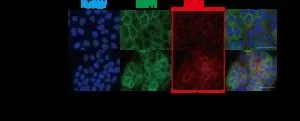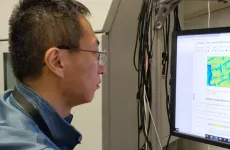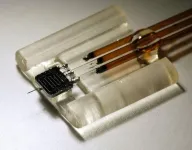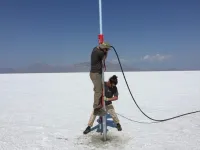In their ‘letter to the world’ they say that cancer is a ‘defining health issue of our time’ that requires a united and collective worldwide response on a par with Covid-19. The scientists argue that we’re at a ‘tipping point’ that could transform how we understand and treat cancer – but more support for life-saving research is required to beat the disease.
The letter is published as Cancer Research UK launched its More Research, Less Cancer campaign - the largest ever philanthropic campaign by a UK charity, which aims to raise £400m.
The charity warned that the number of global cancer cases are predicted to increase by around 50% by 2040.* Domestically, 110,000 deaths could be avoided over the next two decades, if UK cancer mortality rates are reduced by 15% by 2040, CRUK revealed.**
Chief Executive of Cancer Research UK, Michelle Mitchell OBE said:
“We stand on the brink of discoveries that will transform how we understand and treat cancer. Discoveries like new blood tests that detect cancer at an earlier stage, and algorithms that predict someone’s cancer risk and stop it from developing in the first place. These discoveries, that the research and scientific community are on the cusp of, have the potential to save and improve countless lives. But investment is needed. We’re partnering with more philanthropists than ever before, all of whom share our appetite for discovery and translating results into real patient benefit. But we need to go further. We need people with the means and vision to help us bring about a world where everybody can lead longer, better lives, free from the fear of cancer. That’s why we’ve launched our new campaign today. Because more support means more research, and more research means less cancer.”
Leading scientist Sir Paul Nurse, a Nobel Prize winning specialist in genetics and cell biology and chief executive officer of the Francis Crick Institute, is part of the coalition encouraging the world’s donors to invest in scientific endeavours that will continue to create revolutionary, cutting-edge solutions to cancer.
Sir Paul Nurse said:
“With the changes that we are witnessing with technological innovations, work can now be carried out much more quickly. In the next decade, therapies for children’s cancers can be revolutionised, blood tests and personal health data will allow for earlier detection of cancer whilst those with complex cancers will benefit from access to more personalised, life-saving treatments. But, if we are to continue making huge leaps in how we prevent, diagnose and treat cancer, we need the funds.”
Chair of Cancer Research UK, Lord Simon Stevens said:
“Philanthropy powers progress, enabling our researchers to take risks, challenge, and innovate. We’re in a golden age of scientific progress, with the potential to improve and save millions more lives. Few organisations in the world can rival Cancer Research UK’s global impact on cancer. We have the ideas and the expertise – now we need the financial firepower to seize these amazing opportunities and capitalise on our groundbreaking international partnerships.”
The money raised by the campaign will focus on work at the Francis Crick Institute, support the global cancer research initiative Cancer Grand Challenges, support scientists at every stage of their careers and enable more innovation that translates into effective therapies and diagnostics for patients.
The campaign comes at a time when philanthropists are being encouraged to give. Despite analysis by the Beacon Collaborative showing that generosity among wealthy people is increasing***, a recent report by think-tank Onward pointed out that the wealthiest 10 per cent of households now donate half as much as a proportion of their income as those in the poorest 10 per cent, suggesting they could do much more to support charitable causes worldwide.****
Cancer Research UK’s recent report Longer, Better Lives: A Manifesto for Cancer Research and Care said that urgent action was required to address a more than £1 billion funding gap for research into cancer over the next decade. The report said that excluding research funded by industry, charities fund 62% of cancer research, compared to government’s 38%.
Through the More Research, Less Cancer campaign, Cancer Research UK is looking to partner with philanthropists to support transformational research. The campaign has already seen significant investment from philanthropic donations, including generous support from The Chris Banton Foundation, The Kamini and Vindi Banga Family Trust and founder of Segantii Capital Management and owner of Blackpool Football Club Simon Sadler and his wife Gillian.
Simon Sadler said:
“Like so many of us, my family has been affected by cancer. It’s a devastating disease, but what the next decade of research could do, the advances that could be made, the lives that could be saved, is inspiring. But it needs investment. Cancer Research UK provided my wife and I an opportunity to fund some of the incredible work of the CRUK National Cancer Biomarker Centre in Manchester, where I went to university, helping researchers to develop blood tests to detect cancers earlier and make better decisions about the best course of treatment. We’re kept up to date with key progress and find it really rewarding thinking about the impact this could have on improving and saving lives in years to come.”
The More Research, Less Cancer campaign film can be seen here. Introduced by BBC journalist Victoria Derbyshire, the inspiring film brings together key figures in the cancer research community, united by their passion to progress life-saving research.
Visit cruk.org/more-research to find out more.
ENDS
NOTES TO EDITORS
Please note, all campaign links will be live from 00.01 GMT on Thursday 22 February, 2024/19.01 US Eastern Time on Wednesday 21st February.
* https://www.cancerresearchuk.org/health-professional/cancer-statistics/worldwide-cancer/incidence
** Calculated by the Cancer Intelligence team at Cancer Research UK, January 2024. Total deaths avoided for all cancers combined (ICD-10 C00-C97), UK persons, between 2023-25 and 2038-40. This figure is calculated as the difference between number of deaths estimated for this period and population a) if age-standardised mortality rates fall by 6% over the period as projected, and b) if age-standardised mortality rates fall by 15% over the period as per our Longer, better lives ambition (versus 2023-25 baseline: 4% fall by 2028-30, 9% fall by 2033-35, 15% fall by 2038-40)
*** https://www.beaconcollaborative.org.uk/philanthropy-grows-again-in-2023/
**** See full report here: https://www.ukonward.com/reports/giving-back-better-unlocking-philanthropy/
Scientists’ Letter to the World
To those with the means and vision to bring about a better world,
Cancer is a defining health issue of our time. Globally, 18 million people are diagnosed with cancer every year. And 10 million die from the disease.*
The threat posed by the COVID-19 pandemic required a massive global response. Cancer warrants the same urgency, focus and attention.
By 2040 – just 16 years from now - the number of cancer diagnoses globally is predicted to increase by 50%.* This represents an untold amount of pain and suffering to families across the world. Your help can change that.
As leading representatives of the global scientific and research community, we know we’re standing at a tipping point that could transform how we understand and overcome cancer.
Fuelled by advances in AI and technology, the next decade presents a unique opportunity to transform the prevention, diagnosis and treatment of cancer for millions. That’s why we’ve come together to ask you to help accelerate a new golden age of cancer research.
With your support, we could develop new blood tests that detect cancer at an earlier stage. We could develop new algorithms that predict your cancer risk so we can halt cancer before it’s already begun. And we could develop new and better treatments for children's and young people's cancers so more young patients survive and do so without debilitating, life-long side effects.
Worldwide, the research and scientific community stands ready to make breakthroughs that are within our reach. But a lack of funding is holding us back.
This will take a united and collective effort. It will take scientists, researchers, clinicians and entrepreneurs working together across disciplines and continents. It will take constant technological innovation. It will take radical thinkers who are determined to fast-track progress. But to make this a reality: we need your help.
Philanthropic support allows us to be bolder and to take ideas from lab to clinic faster. It means we can take risks, challenge, innovate, seize opportunities and capitalise on international collaboration to improve and save millions of lives.
More support means more research. And more research means less cancer.
*ICD10 C00-C97 excl. C44, https://gco.iarc.fr/en, Accessed January 2024
About Cancer Research UK
Cancer Research UK is the world’s leading cancer charity dedicated to saving lives through research, influence and information.
Cancer Research UK’s pioneering work into the prevention, diagnosis and treatment of cancer has helped save millions of lives.
Cancer Research UK has been at the heart of the progress that has already seen survival in the UK double in the last 50 years.
Today, 2 in 4 people survive their cancer for at least 10 years. Cancer Research UK wants to accelerate progress and see 3 in 4 people surviving their cancer by 2034.
Cancer Research UK supports research into the prevention and treatment of cancer through the work of over 4,000 scientists, doctors and nurses.
Together with its partners and supporters, Cancer Research UK is working towards a world where people can live longer, better lives, free from the fear of cancer.
For further information about Cancer Research UK's work or to find out how to support the charity, please call 0300 123 1022 or visit www.cancerresearchuk.org. Follow us on Twitter and Facebook. END






